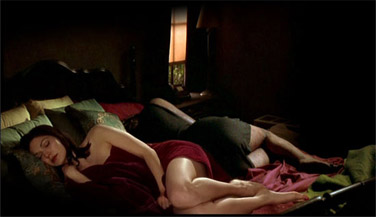Viking Night: Mulholland Drive
By Bruce Hall
January 29, 2013
BoxOfficeProphets.com

With Mulholland Dr., David Lynch takes a satirically bleak shot at the creative infrastructure he's been distancing himself from his whole career. What, David Lynch goofing on Hollywood? How cool would that be? Everybody's favorite stick in the mud, making fun of the business that abuses the muse? That sounds like a rare chance to see a mother get eaten by her cubs. That sounds like Sinatra singing a song about how much it sucks to sing songs.
This should be a fun film full of delicious irony and stunning wit - but these are things that require context and that, my friends, is not what David Lynch is about. Oh well. Things at least start out right, with an attempted murder that gets interrupted by a horrific car crash. The only survivor is the would-be victim - a mysterious, dark-haired woman (Laura Elena Harring) who stumbles, dazed, into the trees. Just beyond is the city of Hollywood, and an unoccupied house where she decides to crash for the night. So far, so good.
The next morning, noted optimist Betty Elms (Naomi Watts) arrives from Ottawa, ready to take Hollywood by storm. Her aunt is in the business, so there's an apartment and an audition already waiting for her. Must be nice. Betty's still whistling Dixie when she comes home to find a certain dark-haired stranger already making herself comfortable. At first Betty assumes she has a roommate, but the goose egg on the woman’s head tells a different story.
She calls herself Rita, and with Betty's help she begins piecing together the accident that robbed her of her memories. A search of Rita's purse reveals a curious amount of money and an even more curious blue key. Something big is going on, but rather than call the police, Betty takes it upon herself to investigate, seemingly unable to distinguish real danger from the hokey soap opera scripts she reads for a living.
It’s exciting, for a little over twenty minutes. Then it goes tumbling off into space like a dead satellite. The next two acts are largely a series of tangentially related vignettes featuring tangentially related characters, plus a grim look at Betty and Rita from a very different perspective. It's an existential gumbo of images and suggestion designed to incite reaction rather than inform it. Lynch toys with your perspective in some genuinely freaky ways, but it's hard to connect without a point of reference.
On one level, Mulholland Dr. clearly sees itself as a droll deconstruction of the movie business, and it briefly makes some headway there when we meet Adam Kesher (Justin Theroux). One part JJ Abrams and two parts Jack Nicholson, Kesher is a brash young director trying to wrestle control of his film back from a pair of comically repulsive studio men. It’s an interesting scene, humming with angst and irony and dread.
But it's hard to tell whether we're supposed to pity Kesher or loathe him. Don’t say both. That’s a copout. Is he a victim of the system or a willing accomplice? Normally there’d be a difference, but in the metaphysical cesspool depicted here, does it really matter? If only we had a point of reference. That way Kesher's eventual confrontation with destiny would feel more like the surreal analogy intended and less like an obscure Seth MacFarlane gag.
There are a lot of implications here, but it's hard to be impressed when you have no idea whether what's being so coyly hidden is even worth all the pretense. All these characters appear, vanish and reconfigure themselves in ways that would seem to state the obvious. Hollywood is a beguiling Mecca that lures naive children into the unforgiving flames of perdition. The studio system is a bloodsucking syndicate that swallows innovation and spits out espresso. This is a place where dreams are built on the same altar where imagination is sacrificed to the gods of commerce.
That's great, but this is where David Lynch has the opposite problem Oliver Stone does. Where one is too heavy handed, the other so self consciously restrained that he forgets to leave the lights on for you. If I was unclear about any of these ideas, I could have just watched Sunset Boulevard. A Star is Born. Boogie Nights. Even an episode of Ice Road Truckers - and come away feeling like I'd been told a story, and not just infected by someone else's self indulgent fever dream.
Perhaps what's most frustrating of all is that few directors excel at putting feelings on screen the way David Lynch does. Even without context, he paints with images and his lens crafts emotion out of light. Rita and Betty open the bag, and breathless anticipation leaps from the screen. Two men meet at a diner for coffee to discuss a fateful dream and you can sense fate looking over your own shoulder - you're sucked into the terrifying void right along with them.
Lynch is famous for keeping the meaning of his films to himself, even from the people who star in them. Many find that frustrating but he never has trouble finding anyone to work with, so surely he is an excellent communicator on some level. But the act of creation is itself an act of exhibition. If you imbue your work with meaning that only you can see, you cut your audience out of the process.
You're no longer charging admission, you're just taking donations. Your audience isn't experiencing your story, they’re subsidizing your expensive hobby. And your actors are delivering fine performances, though as unsure of what they're saying as viewers are of what they're seeing. David Lynch has something to show you, but only he can see it. Something to say, but only he can hear it. That's a shame, because a lot of us want in.
It could have, and should have been different this time.